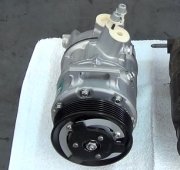That's the pounds of pressure developed in the cylinders when the pistons come up and squeeze the air and fuel. "200" seems rather high but not out of the realm of possibility. "150" to "170" is typical. As an engine wears, more and more of that air is able to leak past the piston rings reducing the pistons' ability to develop that pressure, so higher is better. Even tired engines with a compression of as low as 100 can run smoothly and well. They'll just be down a little on power and fuel mileage. What is much more important than the numbers is that all the numbers for all of the cylinders should be close to the same, typically within around ten percent. When one cylinder is weaker, it won't develop the same power as the rest and you might feel that, especially when accelerating. To say it another way, there is no value in knowing the AVERAGE compression. You want to know the highest one and the lowest one. If they are all close to the same, that's a good sign. If they are all somewhat low, chalk it up to high mileage. If only one or two are real low, suspect a mechanical problem that will not have an easy or inexpensive fix.
There are many other internal problems an engine can develop. Testing the compression just tells the condition of the cylinders, nothing more.
Tuesday, October 30th, 2012 AT 12:01 AM


